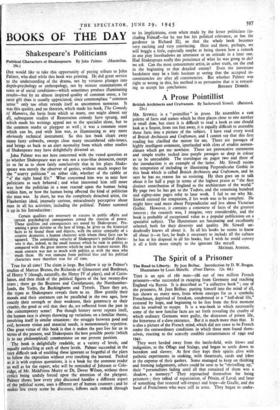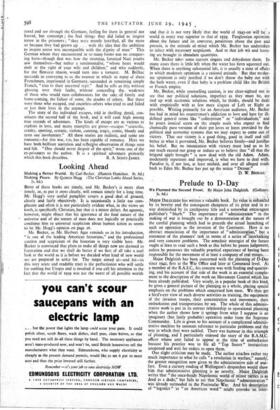The Spirit of a Prisoner
The Road to Liberty. By Jean Brilhac. Introduction by D. W. Brogan. Illustrations by Louis Mittelle. (Peter Davies. 12s. (d.)
THIS is an epic of 186 men-186 out of two million French prisoners—who succeeded in escaping from Germany and reaching
England via Russia. It is described as "a collective book " ; one of the prisoners, M. Jean Brilhac, putting himself into the mind of all, has shown us many men, from whom emerges for us a symbolic Frenchman, deprived of freedom, condemned to a "half-dead life," restored by hope, and beginning to be free from the first moment that he resolved to escape. It is a war-book in which necessarily some of the now familiar facts are set forth revealing the cruelty of which ordinary Germans were guilty, the distresses of prison life, the bitterness of a slave existence. But it is much more than that. It is also a picture of the French mind, which did not cease to be French under the extraordinary conditions in which these men found them- selves, reacting to the scarcely credible circumstances of 1940 and 1941.
They were herded away from the battle-field, with blows and indignities, to the Oflags and Stalags, and began to settle down to boredom and slavery. At first they kept their spirits alive with pathetic experiments in cooking, with theatricals, cards and jokes at the expense of their gaolers. Some managed to keep on thinking and forming judgements, others could be seen to be "shrivelling up," their "personalities fading until all that remained of them was a shadow, a memory." They reproached themselves for being prisoners ; they talked of repatriation, of Petain, of Laval, and later of something that restored self-respect and hope—de Gaulle, and the band of Frenchmen who were still in arms. They began to under- stand and see through the Germans, feeling for them in general not hatred, but contempt ; the foul things they did failed to inspire terror in the prisoners ; "they were merely horrified, all the more so because they had grown up . . . with the idea that the ambition to inspire terror was incompatible with the dignity of man." This German whom they encountered in so many forms was no conquer- ing hero—though that was how the strutting, fanatical Nazi youths saw themselves—but rather a sentimentalist, "whose heart would melt at the sight of your wife and children," and who suddenly, for the flimsiest reason, would turn into a torturer. M. Brilhac succeeds in conveying to us the manner in which so many of these Frenchmen, imprisoned in Germany, succeeded in remaining simply French, "true to their ancestral type." And he tells us this without glossing over their faults, without concealing the weakness of those who would turn collaborators for the sake óf family and home-coming, the failure of some, the doubts of others. But there were those who escaped, and countless others who tried to and failed or lost their lives in the attempt.
The story of the individual escapes, told in thrilling detail, con- stitutes the second half of the book, and it will rank 'high among true records of adventure. The kinds of escape are as various as exploits in love, and many. examples are given—escapes "scientific, cranky, sporting, ecstatic, violent, cunning, tragic, comic, bloody and eyen one involuntary." All these stories are realistic, and some are romantic—for this war, too, has been capable of romance. Here we have both brilliant narration and reflective observation of things seen and felt. "One should never despair of the spirit," wrote one of the ex-prisoners to the author. It is a spiritual adventure primarily



























 Previous page
Previous page